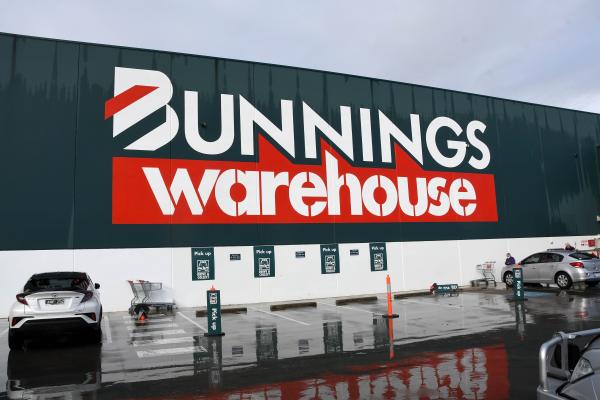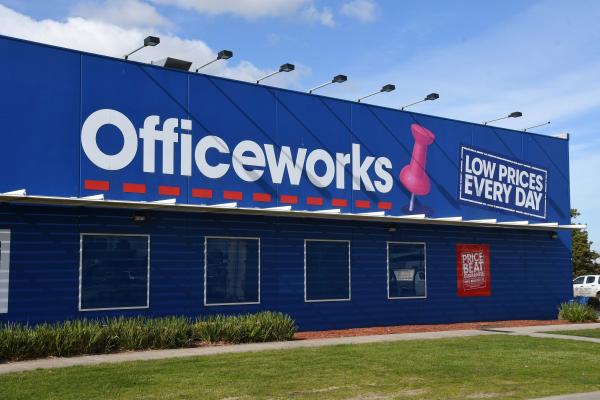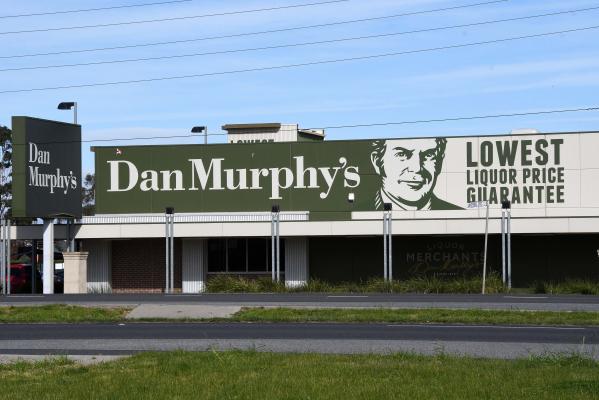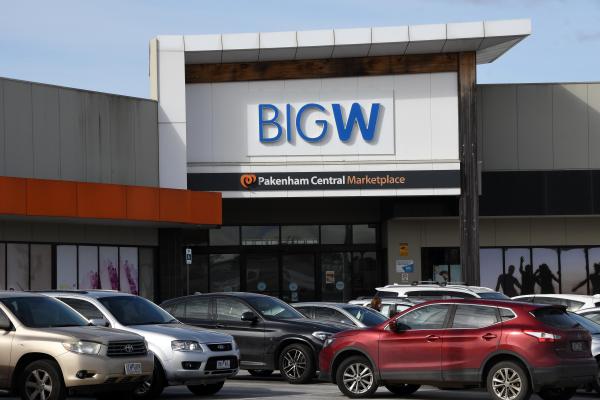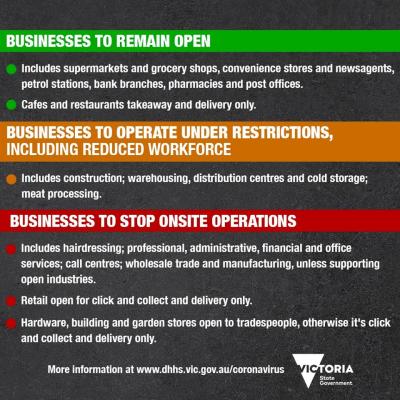By Mitchell Clarke
Businesses have been categorised into three categories under Stage 4 restrictions, as the State Government desperately try to gain control of Victoria’s Covid crisis.
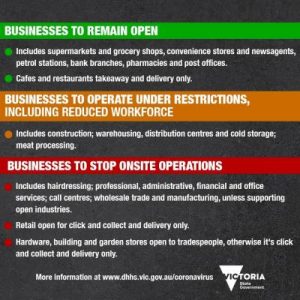
The three categories – open, closed and open with conditions – were announced by Premier Daniel Andrews on Monday 3 August.
Supermarkets, grocery stores, bottle shops, pharmacies, petrol stations, banks, newsagencies, post offices – plus everyone involved in the frontline response – will continue to operate.
Cafes and restaurants will remain open for takeaway and delivery only.
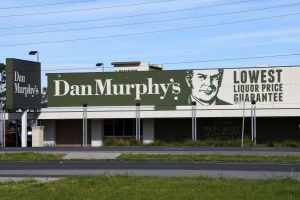
Retail, some manufacturing and administration will be forced to cease onsite operations for the next six weeks from 11.59pm Wednesday 5 August, unless they have special circumstances.
Retail stores will be permitted to operate contactless ‘click and collect’ and delivery services with strict safety protocols in place, and hardware stores – including Bunnings – can remain open onsite, but for tradespeople only.
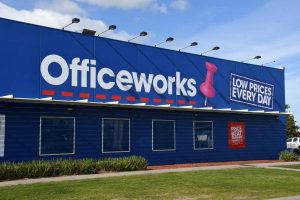

Under the third list, some industries will be able to operate – but under “significantly different conditions”.
All businesses remaining open from 11.59pm on Wednesday 5 August will be required to enact a COVIDSafe plan focused on safety, prevention and response in the event that coronavirus is linked to the workplace.
Industries that can’t close – but have seen clusters or emerging new risks – will notice some changes.
Workplaces continuing to operate will also have additional requirements including extra PPE, staggering shifts, staggering breaks, health declarations and more support for sick workers to ensure they stay home.
The meat industry will be scaled back to two thirds of operational staff.
Warehousing and distribution centres in Melbourne will be limited to no more than two-thirds the normal workforce allowed onsite at any one time.
Some manufacturers will be forced to close their doors including all fabricated metal products, furniture, textiles, leather, footwear, clothing and knitted products.
Construction on major projects – like level crossing removals can continue, but the number of onsite workers will be reduced.
Large scale construction projects – larger than three storeys – will only allow a maximum of 25 percent of normal employees allowed on site; workers will be allowed to attend only one site; and shifts will not be allowed to cross over.
Small scale construction will be limited to five people on site; workers will be allowed to attend only one site; and shifts will not be allowed to cross over.
Sole operators can continue to operate, if they do not have contact with the public, or with people other than those persons living in their primary household.
The status of businesses and industries falling under “grey areas” will be considered by the Industry Coordination Centre within the Department of Jobs, Precincts and Regions.
Businesses in regional Victoria can apply for a $5,000 grant while those in Melbourne and Mitchell Shire can apply for up to $10,000 in recognition of spending longer under restrictions.
Premier Daniel Andrews said the changes, in addition to previous restrictions, will remove around one million people moving around the state.
“Truthfully, I never thought I’d find myself in a position where I’d have to ask people not to go to work,” he said.
“The decision of which column to put millions of Victorian jobs – millions of Victorian workers – could never be clear cut … and, as much as we’d like one, there is no playbook when it comes to a pandemic.
“The only way to get people back to work and businesses back open is by making these tough decisions – and by Victorians abiding by them.
“This will be hard. It’ll be frustrating. It’ll be confusing. For a lot of workers and their families, it’ll be heartbreaking.”
OPEN FOR ON-SITE WORK WITH COVID SAFE PLAN
Agriculture, Forestry and Fishing
- Forestry activity for the purposes of or relating to:
- Production of firewood for heating of premises
- Production of pallets
- Building supplies for construction
- Other permitted activities (e.g. caskets and coffins)
- Farming including operations connected with agriculture, horticulture, viticulture, irrigation, permaculture, apiculture, grains, fibre production, dairy, fishing, aquaculture and livestock
- Commercial fishing
- Intensive agricultural production, including glass- houses and animal production
- Agricultural and veterinary chemicals and vaccines production, transportation and distribution (including the Pig Services Centre)
- Agriculture and farming support business, including and not limited to on-farm consultants, livestock agents, agronomists, shearing contractors, trades services and contracting businesses
- Laboratory and diagnostic services
- Animal saleyards, knackeries and transportation of animals (including livestock and pets)
- Animal feed production, transportation, packaging, sale, and feeding (including livestock and pets);
- Veterinary clinics and related services, including on-farm visits and to veterinary clinics, animal minding services and artificial insemination
- Animal pounds and shelters
- Teaching and scientific facilities which require the keeping or use of animals
- Any business or undertaking involved in relevant support services, such as food safety and verification inspection or associated laboratory services and biosecurity functions
Mining
- Coal mining
- Oil and gas extraction
- Metal ore mining
- Non-metallic mineral mining and quarrying
- Petroleum production
Manufacturing
- Food and beverage production manufacturing
- Meat and meat product manufacturing
- Seafood processing
- Dairy product manufacturing
- Fruit and vegetable processing
- Oil and fat manufacturing
- Grain mill and cereal product manufacturing
- Bakery product manufacturing
- Sugar and Confectionery manufacturing
- Other food and beverage product manufacturing
- Medical equipment and PPE including cloth masks
- Petroleum and coal product manufacturing
- Basic chemical and chemical product manufacturing
- Coffin and casket manufacturing
- Aluminium smelting
- Cement and lime manufacturing
- Pharmaceutical products
- Sanitary products
- Telecommunications infrastructure
- Goods and material necessary for or related to supporting defence or security industries
- Manufacturing to support residential building industry
- Pulp, paper and converted paper product manufacturing
- Printing and support services
- Fertiliser and pesticide manufacturing
- Cleaning compound and toiletry preparation manufacturing
- Glass and glass product manufacturing, including lens
- Computer and electronic equipment manufacturing
- Heating and ventilation manufacturing
- Manufacturing to support critical infrastructure public works
- Manufacture of polyethylene and resins
- Heavy truck manufacturing
- Specialised machinery and equipment
- Microelectronics and semi-conductor products
- Heating and cooling equipment
- Household paper products.
- Transport equipment manufacturing (critical to public transport service; spare parts manufacturing critical to continuity of service)
Electing, Gas, Water and Waste Services
- Electricity services
- Operation of energy systems
- Gas services
- Water supply, sewerage and drainage services
- Waste and resource recovery services including collection, treatment and disposal services, and transfer stations to remain open for commercial contractors
- Liquid fuels and refinery services
- Services to support ongoing provision of electricity, gas, water, sewage and waste and recycling services and their maintenance
Construction
- Construction of critical and essential infrastructure and services to support these projects
- Critical repairs to residential premises, are allowed, where required for emergency or safety
Retail Trade (Services)
- Locksmiths
- Laundry and dry cleaners
Transport, Postal and Warehousing
- Road transport (passenger and freight)
- Rail transport (passenger and freight) – including rail yards
- Water transport (passenger and freight) – including ports and Tasmanian shipping lines
- Air Transport (passenger and freight)
- Pipeline and other transport
- Transport support services
- Vehicle repair, servicing and maintenance
- Towing services
Information Media and Telecommunications
- Telecommunications services
- Newspaper and magazine publishing
- Radio broadcasting
- Television broadcasting
- Internet publishing and broadcasting
- Internet Service Providers, Web Search Portals and Data Processing Services
- Production, broadcast and distribution of telecommunication and supporting infrastructure required to support critical functions, such as law enforcement, public safety, medical or other critical industries and where it cannot be undertaken virtually.
- Screen production
Administrative and Support Services
- Building and grounds maintenance, cleaning, pest control and packaging services are permitted to operate where providing support to an essential industry or where required to maintain the health and safety of Victorians at home or at work.
- Call centres providing critical services – e.g. Police Assistance Line
- Employment services that cannot be delivered online
Financial and Insurance Services
- Bank branches
- Critical banking services to support the provision of services, credit and payment facilities, including the functioning of all operational, treasury, distribution, reporting, communications, monitoring, maintenance, corporate, support and other functions
Health Care and Social Assistance
- All health services provided within and to support a hospital (public and private), registered community health service, publicly funded health services (i.e. AOD and other services), blood bank and an aged care setting including student placements
- Community based services which are based on a referral from a registered medical practitioner (General practitioner and/or medical specialist). This includes all clinical and allied health services
- Services requested under a regulatory framework (e.g. child protection orders for psychology or social worker support)
- Services requested under the education framework (e.g. social workers who may be supporting vulnerable kids in school)
- Immunisation and essential Maternal and Child Health services to operate
- Community based services which are required to ensure the health, safety and wellbeing of vulnerable people
Other Services
- Residential repair and maintenance by exception
- Essential maintenance for safety and upkeep of public and recreational spaces, such as parks, gardens, golf courses
- Motor vehicle and machinery repair by exception
- Automotive, machinery and equipment repair and maintenance are permitted to operate where providing support to a permitted service or industry or where required to maintain the health and safety of Victorians at home or at work.
- Labour hire when servicing an allowed workplace
- Security services where required for the safety of a permitted workplace

